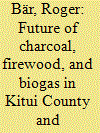|
|
|
Sort Order |
|
|
|
Items / Page
|
|
|
|
|
|
|
| Srl | Item |
| 1 |
ID:
177422


|
|
|
|
|
| Summary/Abstract |
Most households in sub-Saharan Africa rely on wood-based cooking fuels and their number is expected to rise. Despite this, national and subnational energy policies often neglect biomass cooking fuels. A Formative Scenario Analysis process is applied to show how the cooking fuel sector in Kilimanjaro Region (Tanzania) and Kitui County (Kenya) might evolve by 2030. In order to provide relevant knowledge for potential energy policies, this paper aims to identify the main drivers impacting the cooking fuel sector, and to assess and explore current and future demand and supply potential of biomass cooking fuels.
|
|
|
|
|
|
|
|
|
|
|
|
|
|
|
|
| 2 |
ID:
171387


|
|
|
|
|
| Summary/Abstract |
Male-dominated societies often tend to neglect having a consideration for women in the choice of appropriate cooking fuel technology. Traditional cooking technologies have adverse effects particularly on women. These technologies require the use of solid biomass such as wood or biogenic residues, and this practice leads to harmful consequences for individual's health and involves drudgery and hardships especially for women. Even though women can gain immense benefits in switching to a cleaner fuel, their influence over the relevant household energy choice decision is still not well understood. In this study, we use individual-level household survey data from Pakistan to investigate the influence of women empowerment on the decision to adopt and continue using biogas-based cooking technology. To do this, our study analyses the resource and agency profile of women by applying a multivariate analysis using both direct and proxy indicators of women's status. The results show that older, educated, financially empowered women with greater agency and control over resource have a strong influence on the decision to adopt biogas technology. The paper concludes by recommending policies to enhance women's status that could help in fostering the process of transitioning toward clean cooking fuel technology.
|
|
|
|
|
|
|
|
|
|
|
|
|
|
|
|
| 3 |
ID:
110698


|
|
|
|
|
| Publication |
2011.
|
| Summary/Abstract |
In 2007 Indonesia undertook a massive energy program to convert its primary cooking fuel from kerosene to LPG in more than 50 million households. This megaproject, to be completed in late 2011, provided an improved household cooking fuel, with its associated benefits in user costs, cleanliness, convenience, and environment, and reduced the government's huge subsidy for petroleum fuels. Presented from the perspective of Pertamina, Indonesia's sole NOC, and the program implementer, this paper describes the background of the fuels situation, the planning stages, including the preparatory analytical work, targeted market surveys and tests, and the subsequent building of the financial, technical, and institutional models for carrying out the program on an expeditious schedule. It presents the project's major execution steps, results of the program to date, and the unique institutional roles of each party, including the activities and benefits for the government, Pertamina, the public, the industry, and the crucial agents in the fuel supply chains. Finally there is a retrospective policy analysis and a discussion of key factors and challenges in the execution of Indonesia's largest-ever energy initiative to provide improved cooking fuel.
|
|
|
|
|
|
|
|
|
|
|
|
|
|
|
|
|
|
|
|
|